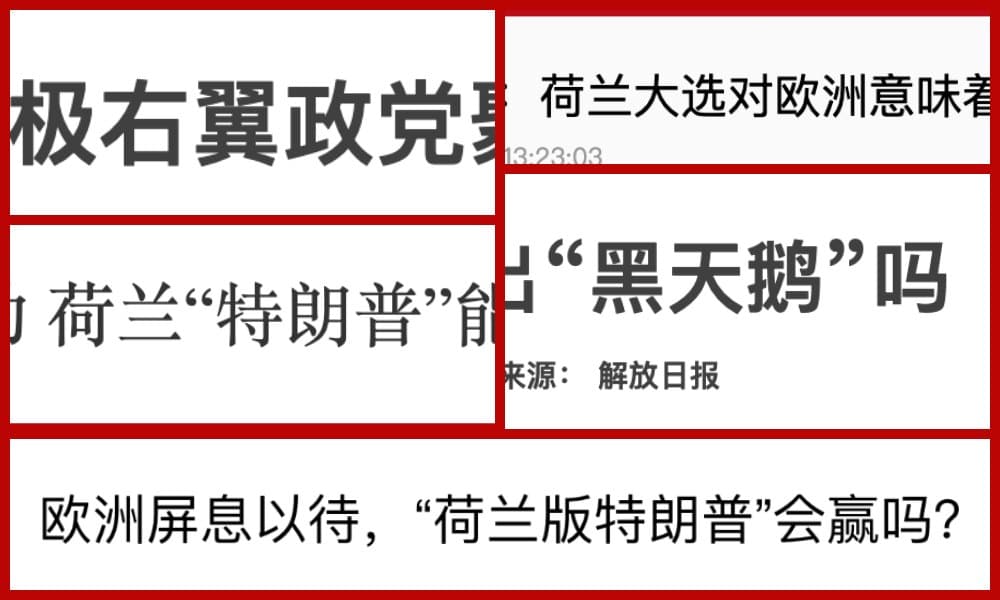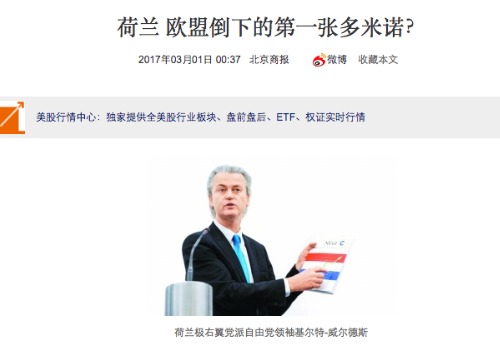China Media
Following the Elections in the West – Chinese Reactions on Wilders and “The Rise of the Right”
Weibo users are closely following the new political trends in the West, with a recent focus on populist Dutch politician Geert Wilders.
Published
8 years agoon

With Trump as the new US president, and popularity of right-wing politicians rising in the Netherlands, France, and Germany, Weibo users are now following the new political trends in the West with a recent focus on populist Dutch politician Geert Wilders. While Chinese state media write about the dangers of the “rise of the right,” many Chinese netizens express their appreciation of Wilders.
On Weibo, the topic ‘following the elections in the West’ has recently become increasingly popular. “The American elections have ended, and Trump is now running the country via Twitter. The French and German elections are coming up next,” – an account named “Following The Elections in the West” (hashtag: #关注西方大选#) says.
Besides the elections in Germany and France, the Dutch elections are also a topic of discussion. Dutch politician Wilders, called Wéi’ěrdésī (维尔德斯 or 威尔德斯) in Chinese, has become a recurring subject in the Chinese media, that represent the results of the Dutch elections as the precursor for the other elections of Continental Europe.
Geert Wilders is the leader of the Dutch right-wing Freedom Party (PVV), which is expected to win many votes in the upcoming elections in the Netherlands. With his plans to “de-Islamize” the Netherlands and his anti-EU and anti-establishment stance, Wilders is winning over voters who feel alienated from the ruling political class.
ALL EYES ON EUROPE
“This Dutch man, who is crazier than Trump, wants to change Europe.”
“Why do we need to closely follow the Dutch elections?”, one Shanghai media source recently wrote on Weibo: “Because after the shock of the 2016 Trump election and Brexit, all eyes are now on Europe. And on the one hand we have Le Pen (勒庞), the leader of the right-wing National Front (FN), and on the other hand, we are now approaching the Dutch elections where we have the Dutch right-wing party of Wilders, who just might become the next prime minister.”
The heightened media attention for European politics with a current focus on the Netherlands and Wilders is noticeable in Chinese state media, with official media such as Global Times and Xinhua writing about it.
In late February, Chinese state tabloid Global Times featured a column about Wilders, which was also shared on Chinese social media platforms Weibo, Baidu forum, and on WeChat. It is titled: “This Dutch man, who is crazier than Trump, wants to change Europe” (这个比特朗普还要疯的荷兰人要让欧洲变天了).
“These days, the whole western world is focused on the Netherlands like never before,” the article starts: “Because within a month the big elections will take place and the potential big winner is an unusual political party that opposes practically everything that mainstream European thinking stands for.”

Photo (size adjusted) by David Sedlecký.
The article quotes Wilders in saying: “The Islam is not a religion – it is an ideology that has sprung from a backward culture. And this ideology might be scarier than Nazism, as the Koran is even more violent and more anti-semitic than Mein Kampf , and it needs to be shut out.”
STRONG ANTI-ISLAM STANCE
“If Wilders’ Freedom Party really wins the Dutch elections it will be a worse nightmare for the EU and Europe than Brexit was.”
The Global Times article argues that if Wilders’ Freedom Party really wins the Dutch elections, “it will be a worse nightmare for the EU and Europe than Brexit was.”
One of the reasons mentioned why it would be “nightmarish” for Wilders to win, is because of the Freedom Party’s strong anti-Islam stance and its proposals to shut down mosques and stop serving halal food in the canteens of Dutch schools.
The Global Times explains this by writing: “They think that Islam is the greatest threat to Western civilization. [They think that] If you let Islam take root in Western countries, then Europe will be Islamized decades later, and Western civilization will be completely destroyed.”
The article continues: “Of course, their stance has greatly angered followers of Islam all across Europe, but when these religious people fight back, they actually precisely do what the Freedom Party expects. Like in 2009, when Geert Wilders came to England for an interview and over 40 Islamic people went to the streets carrying banners that said that ‘Islam will dominate the world.'”
Muslim protesters in Holland hold up ‘Islam will dominate the world’ signs & ‘Sharia for the Netherlands’ https://t.co/F8O9iYwjSC pic.twitter.com/t0yNKYxaGB
— rodriQuez (@rodriQuez) March 12, 2017
Tweet above: the image as used in the Global Times when mentioning the protest by Muslims outside Geert Wilders press conference in central London in October 2009.[/caption]
The article argues that Wilders “represents himself” as a “victim of Islamic violence” – as he cannot leave his house without bodyguards by his side – but that his provocative way of speaking has also led to him facing legal actions within the Netherlands. He was found guilty of inciting discrimination when he asked a roomful of Freedom Party supporters if they wanted to have “more or fewer Moroccans” in the country.
RISE OF THE RIGHT
“The Dutch Freedom Party is not alone, but is part of the rise of other far-right political parties across Europe: this is their year of patriotism.”
Besides his strong anti-Islam stance, another reason why the article says a win by Wilders would be disastrous to Europe, is because of his anti-EU position. This stance comes from the belief that the corrupt nature of the EU organizational structure and the incompetence of the ruling authorities in Brussels have led to the immigration crisis and the financial crisis in Europe.
The column points out that the Freedom Party has greatly gained in popularity in the Netherlands since its establishment in 2006. The Greek debt crisis, the refugee crisis, as well as last year’s Brexit and the election of Trump, have all contributed to its popularity.
The Global Times finally argues that the Dutch Freedom Party is not alone, but is part of the rise of other far-right political parties across Europe, such as the National Front in France. “This is their year of patriotism,” they write.
"2017, j'en suis sûre, sera l'année du réveil des peuples de l'Europe continentale !" #Koblenz pic.twitter.com/q85iyBNzLV
— Marine Le Pen (@MLP_officiel) January 21, 2017
Embedded tweet: Geert Wilders, left, Frauke Petry, Harald Vilimsky, Marine Le Pen and Matteo Salvini at a meeting in 2017.
“The current mainstream media are worried and anxious about the rise of the right-wing forces, but they can only pray that the Europeans won’t be as stupid as the Americans,” the column concludes, also adding: “We the Chinese people just want to say that whatever American, UK, or even French, German, Dutch, or Russian drama, etc., there is, let’s not make this a drama that includes China.”
THE WILDERS EFFECT
“It is relevant to note that the Netherlands can be regarded as the leader of European political trends.”
Besides Global Times, Chinese media outlets Xinhua News and Sina recently also wrote about Wilders. China’s Sina News published an article on March 1st titled “Is Holland the first domino stone to collapse on the European continent?” (荷兰 欧盟倒下的第一张多米诺), and Xinhua‘s article is titled “The Dutch elections are nearing, will populism win?” (荷兰大选在即,民粹主义会得势吗).

Sina News (March 1st): “Will Holland be the first domino stone falling on the European continent?”
Both articles suggest that parties such as the Freedom Party win support because of their anti-immigration and anti-EU tendencies, but that voters of Wilders do not necessarily want him to actually lead the country: “People may vote for Wilders as a protest vote,” they write.
They emphasize the role of the Netherlands on the European continent: “It is relevant to note that the Netherlands can be regarded as the leader of European political trends,” Sina News says, looking back at political trends in the 1960s and 1990s.
Xinhua also brings up the so-called ‘Wilders Effect’ (威尔德斯效应). The ‘Wilders Effect’, also mentioned by Tom-Jan Meeus on Politico.eu, implies that the harsher Wilders is criticized (e.g. by the mainstream media or ruling politicians), the better his chances of winning are.
Even if Wilders comes out as the big winner in the upcoming elections, the chances of him forming a governing coalition are slim as few other parties are willing to govern alongside Wilders after the elections. However, it is precisely the rejection of Wilders that testifies to his accusations that “the political elites disregard the will of the people.”
Although Chinese state media emphasize the dangers of Wilders’ popularity and “the rise of the right,” Chinese responses on Weibo and other social media platforms reveal that many netizens seemingly support the far-right Dutch politician.
CHINESE NETIZENS RESPOND
“Supporters of Islam need to reflect on why it is that all over the world in developed nations people like Trump are receiving the support of the people.”
On Weibo, one Chinese blogger recently wrote about Wilders: “The populist Geert Wilders promises (..) to make the Netherlands ‘great again.’ His ‘Freedom Party’ (自由党) might win more seats than ever before. He is often called the “Dutch Trump”, as he is just as opposed to muslim immigration as the new American president. He also has no trust in the media and loves to send out tweets.”
The post continues: “This ‘Dutch Trump’ wants no more acceptance of immigrants or refugees from muslim countries, as Holland is becoming ‘Islamized’, [he wants to] prohibit the wearing of Islamic headscarves in public places (..), to let the Koran classify as a banned book, a closure of mosques and Islamic schools, the Netherlands should get out of the EU, criminals with a dual citizenship have to be deported, income taxes have to be reduced, people should receive pension at 65 (..).”
In response to this post and the state media articles, many netizens write that they agree with Wilders’ ideas about Islam and that it can be viewed as an ideology, saying: “Isn’t he right about this?”
One Weibo user (@乡梦天地) writes: “Is Islam still a ‘religion’? Perhaps it has deteriorated and has become an ideology that serves a religion. In a normal country, religion is often used as a way to serve the ruling class. But now, it seems that the ruling class is serving religion instead.”
Other Chinese commenters say that “the religion of Islam is an obstruction to the development of society.”
“I have been to Holland and the streets are very ‘green'”, one person says (‘green’ being slang to refer to ‘islam’). “Europe has reached a crucial moment of life or death, turning right is a final opportunity to save themselves,” one commenter (@传捷天下) writes.
We need to save our Western civilization.
There is only one way.
No more Islam.#deislamize pic.twitter.com/RznKmpPcKk
— Geert Wilders (@geertwilderspvv) May 14, 2016
Embedded: Wilders cartoon (same image republished in Global Times).
“Supporters of Islam need to reflect on why it is that all over the world in developed nations people like Trump are receiving the support of the people,” another person responds.
Several netizens say: “There is nothing wrong (没毛病) with what [Wilders] says, it is the truth.”
One person even says: “It would be a blessing for the Netherlands if he were to be elected.”
People responding to the post on Weibo say they look forward to him winning the elections: “I support Wilders becoming the prime minister of Holland!”, one Guangdong-based English tutor writes.
WHAT’S THE FUSS?
“Europe is like a domino game. When one right-wing party comes up, others will follow. When one country leaves the EU, others will also leave the EU.”
But there are also netizens who worry about the rise in popularity of politicians such as Wilders: “Hasn’t the rise of populism already entered a point of no return?”
Like the Global Times column, they also see the rise of right-wing parties as a global trend rather than a European one (“全球右转是个趋势”). Some of them write that “the rise of the right” is a “dangerous trend.”
One France-based Weibo user (@欧洲行-私人订制) writes: “Europe is like a domino game. When one right-wing party comes up, others will follow. When one country leaves the EU, others will also leave the EU.”
But precisely this anti-EU stance is what many other netizens also appreciate in Wilders. When Wilders announced that a Dutch ‘Nexit’ referendum would follow after the Brexit, some Weibo commenters said: “Getting out of the EU might be the only way to save yourself,” although others said that organizing a referendum over such a crucial issue is “much too risky.”
There are also many commenters who do not understand what the fuss is all about: “Holland is such a small country,” a Baidu user writes. One Weibo commenter (@TOAac) also says: “So what, Holland? What will happen in Germany and France is what really matters.”
According to the latest polls, Geert Wilders has now fallen behind the conservative VVD party of Prime Minister Mark Rutte for the first time since November 2016. But until the results come out of the Dutch elections of March 15, nothing is sure.
“In the end, this all is a choice that has to be made by the Dutch voters,” one Baidu netizen concludes.
– By Manya Koetse
Follow @WhatsOnWeibo
Chinese (state) media about Wilders:
Global Times (环球时报). 2017. “这个比特朗普还要疯的荷兰人要让欧洲变天了 [This Dutch Man Crazier Than Trump Wants To Change Europe]” (In Chinese). Global Times, February 21 http://global.sina.cn/szzx/article/20170221/00bf33efd2851000.html [2.3.17].
Sina News (新浪). 2017. “荷兰 欧盟倒下的第一张多米诺 [Is Holland the first domino stone to collapse on the European continent?]” (In Chinese). Sina News, March 1 http://finance.sina.com.cn/stock/usstock/c/2017-03-01/doc-ifyavwcv9263847.shtml [2.3.17].
Xinhua (新华). 2017. “荷兰大选在即,民粹主义会得势吗? [The Dutch Elections Are Nearing, Will Populism Win Power?]” (In Chinese). Xinhuanet.com, February 16 http://news.xinhuanet.com/world/2017-02/16/c_129481542.htm [2.3.17].
Spotted a mistake or want to add something? Please let us know in comments below or email us.

Directly support Manya Koetse. By supporting this author you make future articles possible and help the maintenance and independence of this site. Donate directly through Paypal here. Also check out the What’s on Weibo donations page for donations through creditcard & WeChat and for more information.
©2017 Whatsonweibo. All rights reserved. Do not reproduce our content without permission – you can contact us at info@whatsonweibo.com.
Manya is the founder and editor-in-chief of What's on Weibo, offering independent analysis of social trends, online media, and digital culture in China for over a decade. Subscribe to gain access to content, including the Weibo Watch newsletter, which provides deeper insights into the China trends that matter. More about Manya at manyakoetse.com or follow on X.

China Media
12-Year-Old Girl from Shandong Gets Infected with HPV: Viral Case Exposes Failures in Protecting Minors
A doctor in Tai’an faced resistance when she tried to report a 12-year-old girl’s HPV case. She then turned to social media instead.
Published
1 month agoon
December 18, 2024
A 12-year-old girl from Shandong was diagnosed with HPV at a local hospital. When a doctor attempted to report the case, she faced resistance. Weibo users are now criticizing how the incident was handled.
Over the past week, there has been significant uproar on Chinese social media regarding how authorities, official channels, and state media in China have handled cases of sexual abuse and rape involving female victims and male perpetrators, often portraying the perpetrators in a way that appears to diminish their culpability.
One earlier case, which we covered here, involved a mentally ill female MA graduate from Shanxi who had been missing for over 13 years. She was eventually found living in the home of a man who had been sexually exploiting her, resulting in at least two children. The initial police report described the situation as the woman being “taken in” or “sheltered” by the man, a phrasing that outraged many netizens for seemingly portraying the man as benevolent, despite his actions potentially constituting rape.
Adding to the outrage, it was later revealed that local authorities and villagers had been aware of the situation for years but failed to intervene or help the woman escape her circumstances.
Currently, another case trending online involves a 12-year-old girl from Tai’an, Shandong, who was admitted to the hospital in Xintai on December 12 after testing positive for HPV.
HPV stands for Human Papillomavirus, a common sexually transmitted infection that can infect both men and women. Over 80% of women experience HPV infection at least once in their lifetime. While most HPV infections clear naturally within two years, some high-risk HPV types can cause serious illness including cancer.
“How can you be sure she was sexually assaulted?”
The 12-year-old girl in question had initially sought treatment for pelvic inflammatory disease, but upon review, her doctor discovered that she had been previously treated for vaginitis six months earlier. During further discussions with the girl, the doctor learned she had been sexually active with a boy five years her senior and was no longer attending school.
Given that the age of consent in China is 14 years old, the doctor sought to report the case to authorities. However, this effort was reportedly met with resistance from the hospital’s medical department, where she was allegedly questioned: “How can you be sure she was sexually assaulted?”
When attempts to escalate the case to the women’s federation and health commission went unanswered, the doctor turned to a blogger she knew (@反射弧超长星人影九) for help in raising awareness.
The blogger shared the story on Weibo but failed to receive a response through private messages from the Tai’an Police. They then contacted a police-affiliated Weibo channel they were familiar with, which eventually succeeded in alerting the Shandong police, prompting the formation of an investigation team.
As a result, on December 16, the 17-year-old boy was arrested and is now facing legal criminal measures.
According to Morning News (@新闻晨报), the boy in question is the 17-year-old Li (李某某), who had been in contact with the girl through the internet since May of 2024 after which they reportedly “developed a romantic relationship” and had “sexual relations.”
Meanwhile, fearing for her job, the doctor reportedly convinced the blogger to delete or privatize the posts. The blogger was also contacted by the hospital, which had somehow obtained the blogger’s phone number, asking for the post to be taken down. Despite this, the case had already gone viral.
The blogger, meanwhile, expressed frustration after the case gained widespread media traction, accusing others of sharing it simply to generate traffic. They argued that once the police had intervened, their goal had been achieved.
But the case goes beyond this specific story alone, and sparked broader criticisms on Chinese social media. Netizens have pointed out systemic failures that did not protect the girl, including the child’s parents, her school, and the hospital’s medical department, all of whom appeared to have ignored or silenced the issue. As WeChat blogging account Xinwenge wrote: “They all tacitly colluded.”
Xinwenge also referenced another case from 2020 involving a minor in Dongguang, Liaoning, who was raped and subsequently underwent an abortion. After the girl’s mother reported the incident to the police, the procuratorate discovered that a hospital outpatient department had performed the abortion but failed to report it as required by law. The procuratorate notified the health bureau, which fined the hospital 20,000 yuan ($2745) and revoked the department’s license.
Didn’t the hospital in Tai’an also violate mandatory reporting requirements? Additionally, why did the school allow a 12-year-old girl to drop out of the compulsory education programme?
“This is not a “boyfriend” or a “romantic relationship.””
The media reporting surrounding this case also triggered anger, as it failed to accurately phrase the incident as involving a raped minor, instead describing it as a girl having ‘sexual relations’ with a much older ‘boyfriend.’
Under Chinese law, engaging in sexual activity with someone under 14, regardless of their perceived willingness, is considered statutory rape. A 12-year-old is legally unable to give consent to sexual activity.
“The [Weibo] hashtag should not be “12-Year-Old Infected with HPV, 17-Year-Old Boyfriend Arrested” (#12岁女孩感染HPV其17岁男友被抓#); it should instead be “17-Year-Old Boy Sexually Assaulted 12-Year-Old, Causing Her to Become Infected” (#17岁男孩性侵12岁女孩致其感染#).”
Another blogger wrote: “First, we had the MA graduate from Shanxi who was forced into marriage and having kids, and it was called “being sheltered.” Now, we have a little girl from Shandong being raped and contracting HPV, and it was called “having a boyfriend.” A twelve-year-old is just a child, a sixth-grader in elementary school, who had been sexually active for over six months. This is not a “boyfriend” or a “romantic relationship.” The proper way to say it is that a 17-year-old male lured and raped a 12-year-old girl, infecting her with HPV.”
By now, the case has garnered widespread attention. The hashtag “12-Year-Old Infected with HPV, 17-Year-Old Boyfriend Arrested” (#12岁女孩感染HPV其17岁男友被抓#) has been viewed over 160 million times on Weibo, while the hashtag “Official Notification on 12-Year-Old Infected with HPV” (#官方通报12岁女孩感染hpv#) has received over 90 million clicks.
Besides the outrage over the individuals and institutions that tried to suppress the story, this incident has also sparked a broader discussion about the lack of adequate and timely sexual education for minors in Chinese schools. Liu Wenli (刘文利), an expert in children’s sexual education, argued on Weibo that both parents and schools play critical roles in teaching children about sex, their bodies, personal boundaries, and the risks of engaging with strangers online.
“Protecting children goes beyond shielding them from HPV infection,” Liu writes. “It means safeguarding them from all forms of harm. Sexual education is an essential part of this process, ensuring every child’s healthy and safe development.”
Many netizens discussing this case have expressed hope that the female doctor who brought the issue to light will not face repercussions or lose her job. They have praised her for exposing the incident and pursuing justice for the girl, alongside the efforts of those on Weibo who helped amplify the story.
The blogger who played a key role in exposing the story recently wrote: “I sure hope the authorities will give an award to the female doctor for reported this case in accordance with the law.” For some, the doctor is nothing short of a hero: “This doctor truly is my role model.”
By Manya Koetse, with contributions by Miranda Barnes
(follow on X, LinkedIn, or Instagram)
Spotted a mistake or want to add something? Please let us know in comments below or email us. First-time commenters, please be patient – we will have to manually approve your comment before it appears.
©2024 Whatsonweibo. All rights reserved. Do not reproduce our content without permission – you can contact us at info@whatsonweibo.com.
China Media
Hu Xijin’s Comeback to Weibo
After 90 days of silence, Hu Xijin is back on Weibo—but not everyone’s thrilled.
Published
3 months agoon
November 7, 2024
A SHORTER VERSION OF THIS ARTICLE WAS PART OF THE MOST RECENT WEIBO WATCH NEWSLETTER.
For nearly 100 days, since July 27, the well-known social and political commentator Hu Xijin (胡锡进) remained silent on Chinese social media. This was highly unusual for the columnist and former Global Times editor-in-chief, who typically posts multiple Weibo updates daily, along with regular updates on his X account and video commentaries. His Weibo account boasts over 24.8 million followers.
Various foreign media outlets speculated that his silence might be related to comments he previously made about the Third Plenum and Chinese economics, especially regarding China’s shift to treating public and private enterprises equally. But without any official statement, Chinese netizens were left to speculate about his whereabouts.
Most assumed he had, in some way, taken a “wrong” stance in his commentary on the economy and stock market, or perhaps on politically sensitive topics like the Suzhou stabbing of a Japanese student, which might have led to his being sidelined for a while. He certainly wouldn’t be the first prominent influencer or celebrity to disappear from social media and public view—when Alibaba’s Jack Ma seemed to have fallen out of favor with authorities, he went missing, sparking public concern.
After 90 days of absence, the most-searched phrases on Weibo tied to Hu Xijin’s name included:
胡锡进解封 “Hu Xijin ban lifted”
胡锡进微博解禁 “Hu Xijin’s Weibo account unblocked”
胡锡进禁言 “Hu Xijin silenced”
胡锡进跳楼 “Hu Xijin jumped off a building”

On October 31, Hu suddenly reappeared on Weibo with a post praising the newly opened Chaobai River Bridge, which connects Beijing to Dachang in Hebei—where Hu owns a home—significantly reducing travel time and making the more affordable Dachang area attractive to people from Beijing. The post received over 9,000 comments and 25,000 likes, with many welcoming back the old journalist. “You’re back!” and “Old Hu, I didn’t see you on Weibo for so long. Although I regularly curse your posts, I missed you,” were among the replies.
When Hu wrote about Trump’s win, the top comment read: “Old Trump is back, just like you!”
Not everyone, however, is thrilled to see Hu’s return. Blogger Bad Potato (@一个坏土豆) criticized Hu, claiming that with his frequent posts and shifting views, he likes to jump on trends and gauge public opinion—but is actually not very skilled at it, allegedly contributing to a toxic online environment.
Other bloggers have also taken issue with Hu’s tendency to contradict himself or backtrack on stances he takes in his posts.
Some have noted that while Hu has returned, his posts seem to lack “soul.” For instance, his recent two posts about Trump’s win were just one sentence each. Perhaps, now that his return is fresh, Hu is carefully treading the line on what to comment on—or not.
Nevertheless, a post he made on November 3rd sparked plenty of discussion. In it, Hu addressed the story of math ‘genius’ Jiang Ping (姜萍), the 17-year-old vocational school student who made it to the top 12 of the Alibaba Global Mathematics Competition earlier this year. As covered in our recent newsletter, the final results revealed that both Jiang and her teacher were disqualified for violating rules about collaborating with others.
In his post, Hu criticized the “Jiang Ping fever” (姜萍热) that had flooded social media following her initial qualification, as well as Jiang’s teacher Wang Runqiu (王润秋), who allegedly misled the underage Jiang into breaking the rules.
The post was somewhat controversial because Hu himself had previously stated that those who doubted Jiang’s sudden rise as a math talent and presumed her guilty of cheating were coming from a place of “darkness.” That post, from June 23 of this year, has since been deleted.
Despite the criticism, some appreciate Hu’s consistency in being inconsistent: “Hu Xijin remains the same Hu Xijin, always shifting with the tide.”

Hu has not directly addressed his absence from Weibo. Instead, he shared a photo of himself from 1978, when he joined the military. In that post, he reflected on his journey of growth, learning, and commitment to the country. Judging by his renewed frequency of posting, it seems he’s also recommitted to Weibo.
By Manya Koetse
(follow on X, LinkedIn, or Instagram)
Spotted a mistake or want to add something? Please let us know in comments below or email us. First-time commenters, please be patient – we will have to manually approve your comment before it appears.
©2024 Whatsonweibo. All rights reserved. Do not reproduce our content without permission – you can contact us at info@whatsonweibo.com.
What’s on Weibo Chapters
Subscribe

“Black Myth: Wukong”: From Gaming Screens to the CMG Spring Festival Gala?

“Dear Li Hua”: The TikTok/Xiaohongshu Honeymoon Explained

TikTok Refugees, Xiaohongshu, and the Letters from Li Hua

15 Years of Weibo: The Evolution of China’s Social Media Giant

Introducing What’s on Weibo Chapters

The Price of Writing Smut: Inside China’s Crackdown on Erotic Fiction

Controversial Wanghong Livestreamers Are Becoming a Weibo Staple in China

Weibo Watch: “Comrade Trump Returns to the Palace”

The ‘Cycling to Kaifeng’ Trend: How It Started, How It’s Going

Hu Xijin’s Comeback to Weibo

Our Picks: Top 10 Chinese Buzzwords and Phrases of 2024 Explained

The Viral Bao’an: How a Xiaoxitian Security Guard Became Famous Over a Pay Raise

Why Chinese Hit Movie “Her Story” is ‘Good Stuff’: Stirring Controversy and Celebrating Female Perspectives

Chiung Yao’s Suicide Farewell Letter: An English Translation

12-Year-Old Girl from Shandong Gets Infected with HPV: Viral Case Exposes Failures in Protecting Minors
Get in touch
Would you like to become a contributor, or do you have any tips or suggestions? Get in touch here!
Popular Reads
-

 China Insight9 months ago
China Insight9 months agoThe Tragic Story of “Fat Cat”: How a Chinese Gamer’s Suicide Went Viral
-

 China Music10 months ago
China Music10 months agoThe Chinese Viral TikTok Song Explained (No, It’s Not About Samsung)
-

 China Insight11 months ago
China Insight11 months agoThe ‘Two Sessions’ Suggestions: Six Proposals Raising Online Discussions
-

 China Digital8 months ago
China Digital8 months agoChina’s 2024 Gaokao Triggers Online Discussions on AI








cool
March 2, 2017 at 10:28 pm
no wonder many people Chinese came to support Wilders due to his anti-Islam stance because religion as whole is often taught hindrance to development in the Chinese state media and educational institutes. One most striking observance I noticed that no one among them thought about western role in middle east which brought extremist threats worldwide.
Joey
March 5, 2017 at 8:42 am
It’s more about Chinese netizens believing that a unicultural (or even uniracial) society as a prosperous one. They see multiculturalism as a sickness that has overtaken the West, and a component of its decline.
Speakthetruth
March 6, 2017 at 9:55 am
Geert Wilders MUST win the election if Europe wishes to regain her sanity and her sovereignty she had lost from decades of neglect from past leaderships.